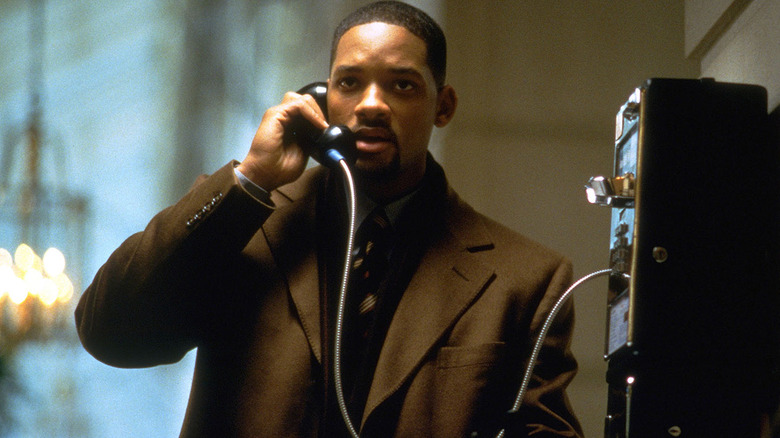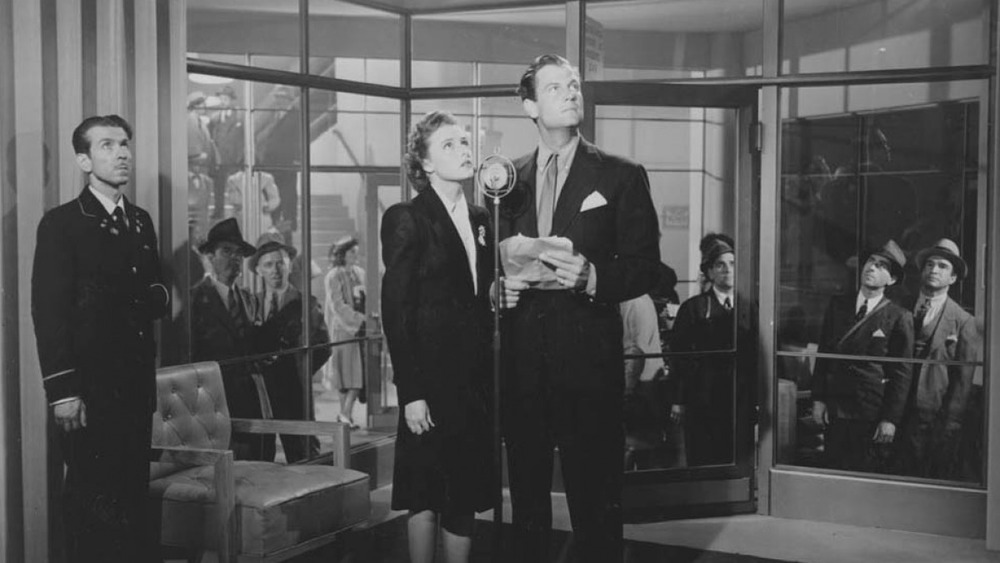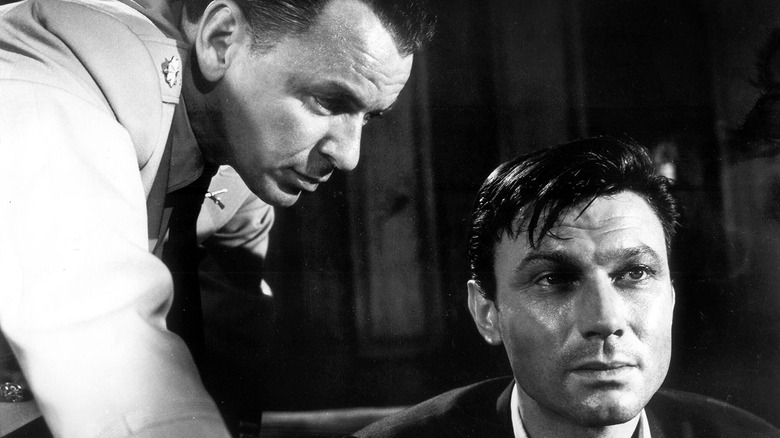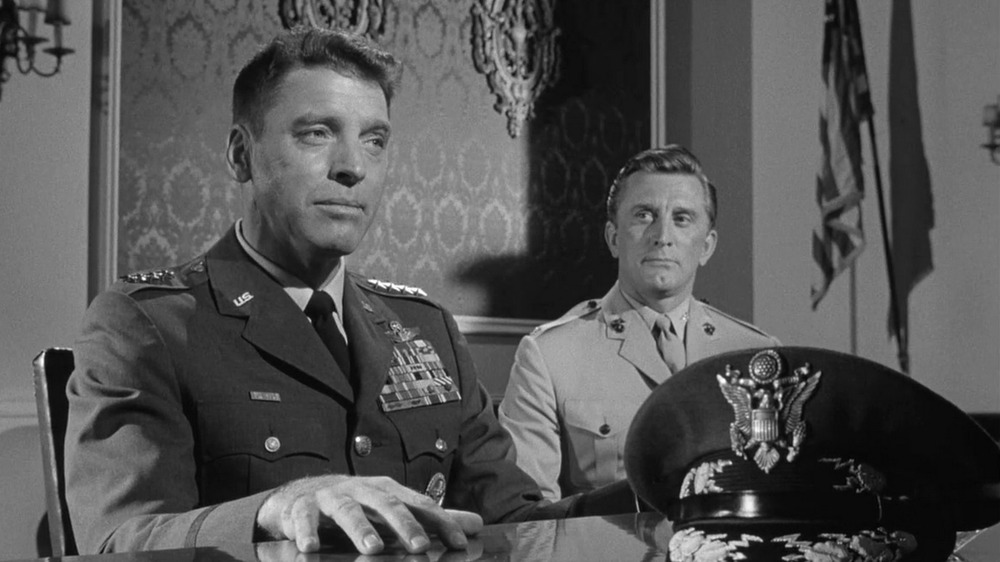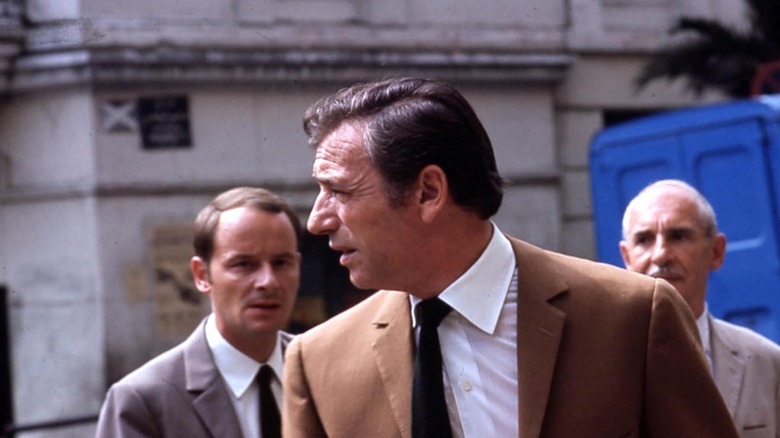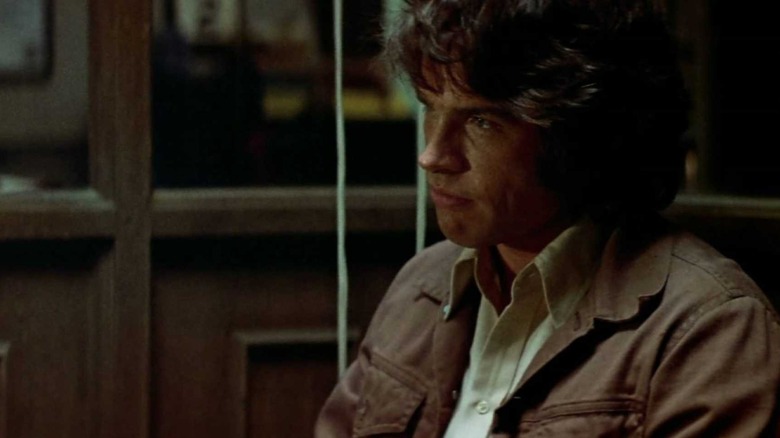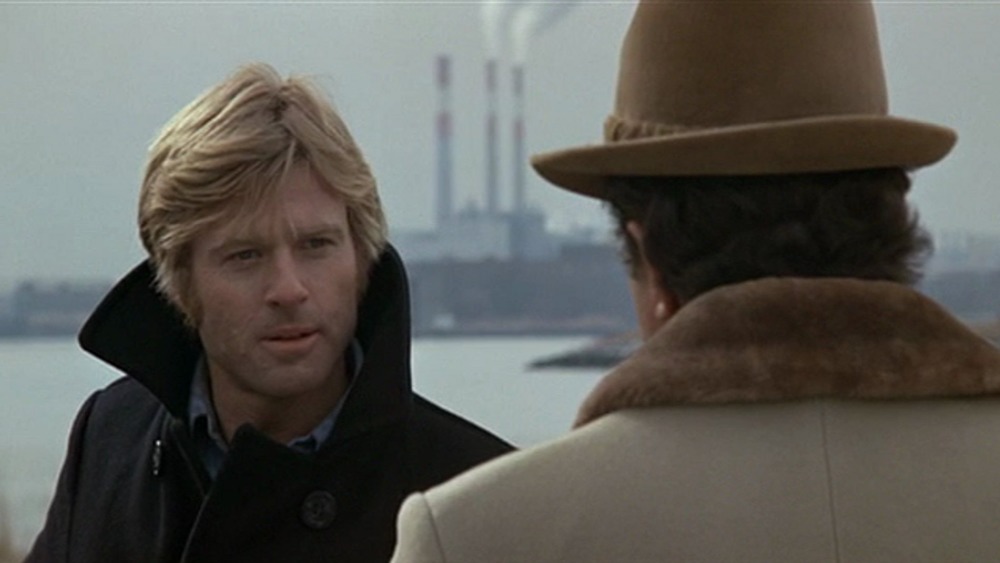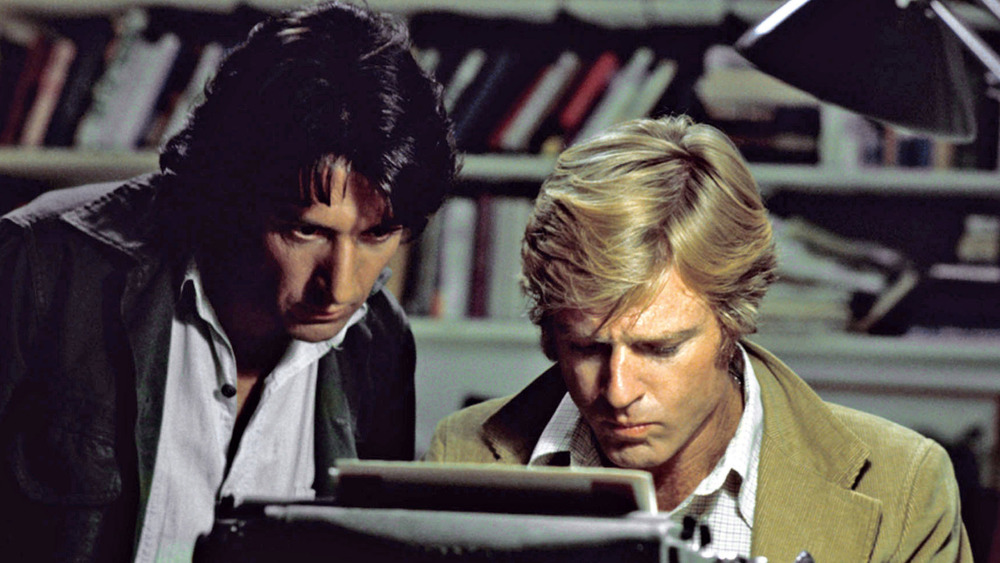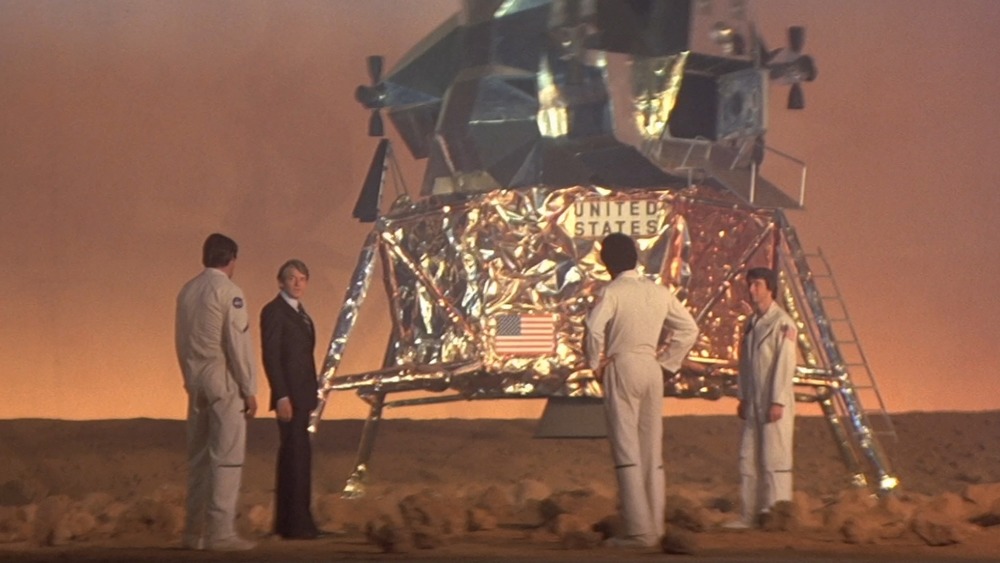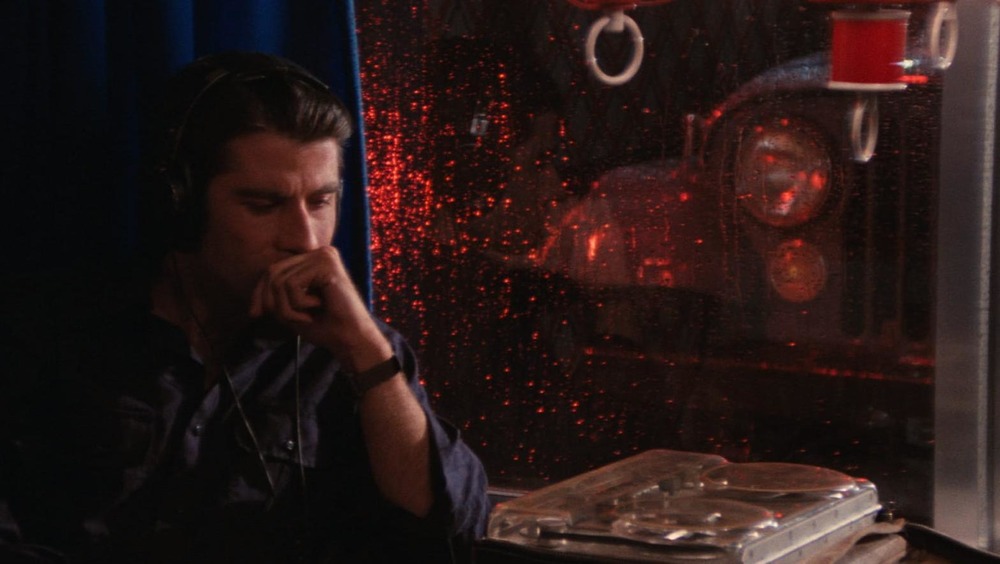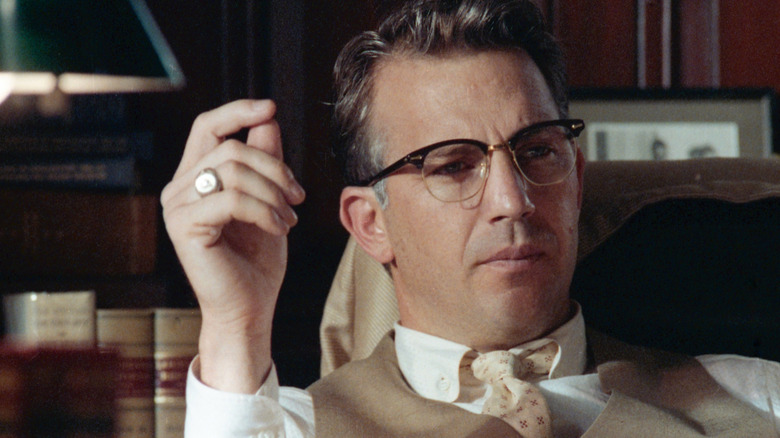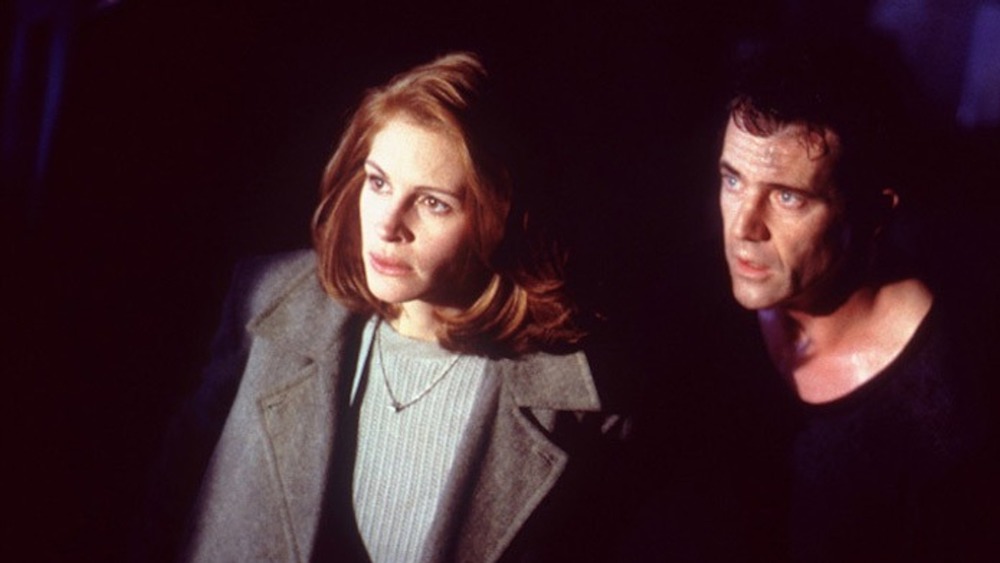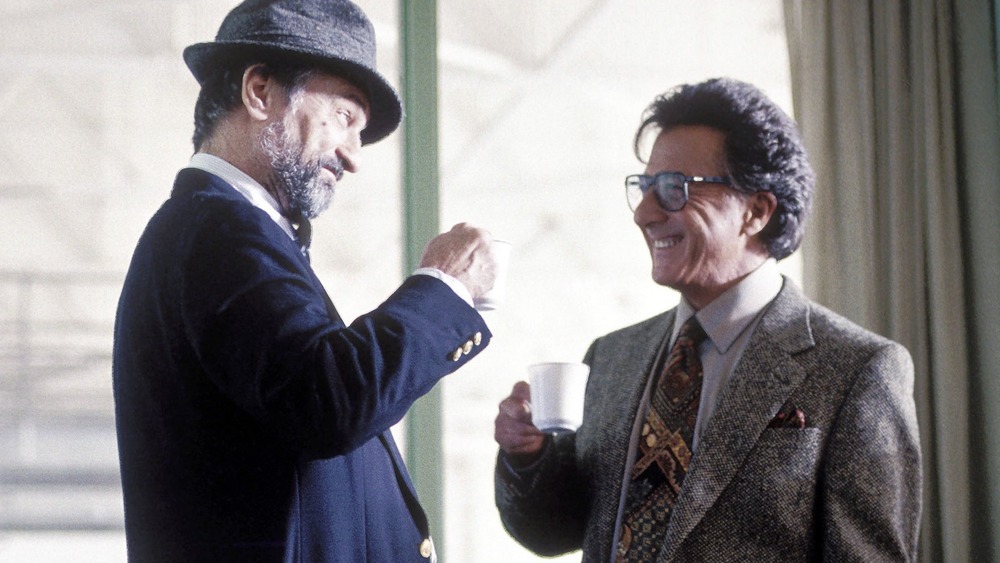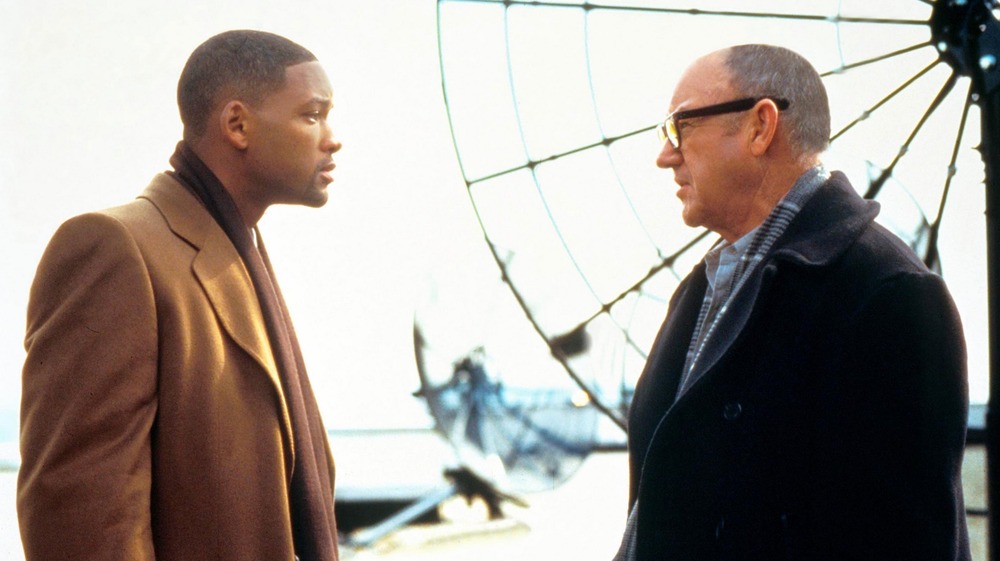Political Conspiracy Movies To Make You Even More Paranoid
We live in an era of conspiracy theories, in which it is increasingly rare for people to take anything at face value. Life is tough enough, so when we are confronted with a truth that is too disappointing, too heartbreaking, or just too unbelievable (according to our own personal belief system), we look for a more satisfying, and often comforting, answer, in our own alternate version of the truth.
Hollywood has known about this tendency for a long time, and a good conspiracy thriller — especially the political kind — has often been a sure bet with audiences. But just as conspiracy theories in real life can lead people down some pretty bizarre rabbit holes, movies about them can sometimes lead us to question everything we thought we knew about the world and how it works.
If you're already worried about shadow governments, techno-dictators, and mass hypnosis, the films we lay out here aren't exactly going to reassure you. It's true that some of them end on more optimistic notes than others, but almost none of them will set your mind at ease about what may or may not be going on every day behind the scenes of history. If you're not paranoid already, a marathon of these movies may just do the trick. These are the most terrifying, thought-provoking, and unsettling conspiracy movies around.
Foreign Correspondent
Leave it to Alfred Hitchcock to make an early political conspiracy thriller that actually spilled over into real life. Hitch's second Hollywood production (after Rebecca, against which it competed for the 1940 Best Picture Oscar and lost) is based on a 1935 memoir called Personal History by Vincent Sheean, though it strays pretty far from the source material. The movie tells the story of reporter John Jones (Joel McCrea), who is sent on assignment to Europe in August 1939 to see whether or not Germany poses a serious threat to the world. Jones' investigation puts him on the trail of enemy spies in England and the eventual discovery of a conspiracy spanning the continent.
After completing principal photography on the film, Hitchcock went back home to England where he learned that the Germans were expected to begin bombing the U.K. at any time. He returned to the U.S. and shot a new ending for the film, in which Jones broadcasts a live account of the bombing of England via radio to the States. As often happens, the line between the movies and real life is chillingly blurred.
The Manchurian Candidate
The original 1962 film of this name, directed by John Frankenheimer, is the quintessential example of its genre — so much so that the term "Manchurian candidate" has become part of the vernacular. The film, based on the novel by Richard Condon, stars Frank Sinatra as Bennett Marco, a Korean War vet and Army Intelligence officer who starts to realize that all is not well with his platoon mate, a supposed war hero named Raymond Shaw (Laurence Harvey).
Marco uncovers a plot that involves Shaw's scheming, depraved mother (Angela Lansbury), a devastating mind control technique, and a communist plan to install a dictatorship in the U.S., all of it centered around Shaw and his family. Frankenheimer, a master of using the camera to take us inside the heads of his psychologically compromised characters, is at the top of his game, even using an out of focus shot to get the best performance from the famously uneven Sinatra.
This gripping classic was remade in 2004 with an updated storyline that replaces the communists with an evil corporation, starring Denzel Washington, Liev Schreiber, and Meryl Streep. It's good, but not as surreal as the original, although the cast — especially Streep — were cited for their work.
Seven Days in May
Director John Frankenheimer followed one conspiracy classic, 1962's The Manchurian Candidate, with another: 1964's Seven Days in May. This film, which boasts a script by The Twilight Zone creator and host Rod Serling, is among the most chilling of all thrillers, because it seems so plausible. As Kirk Douglas gradually uncovers a plot to stage a coup against the U.S. government, the film's tension climbs to nigh-unbearable heights.
This plot is masterminded by the Chairman of the Joint Chiefs of Staff, General James Mattoon Scott (Burt Lancaster), who intends to overthrow President Jordan Lyman (Fredric March) after the latter signs a nuclear disarmament treaty with the Soviet Union. Douglas plays Colonel "Jiggs" Casey, director of the Joint Chiefs and Mattoon's right hand man — until he discovers what his boss is up to. It then becomes a race against time to convince the president and other high-ranking officials that the plot is real.
Seven Days in May features outstanding performances from Douglas, March, and especially Lancaster as a charismatic demagogue who gets within hours of bringing democracy to its knees. Lancaster's character was reportedly based on two real-life military men, Curtis LeMay and Edwin Walker. Both of them clashed with President John F. Kennedy, who read the novel that Seven Days in May was based on, believed it could happen in real life, and encouraged his friend Frankenheimer to make the picture.
Z
Many conspiracy theories center around the idea of shocking government coups. This 1969 classic shows you how it's done, step by brutal step. The sad part is, it's rooted in true events: Although it's based on a novel, Vassilis Vassilikos' Z, the film, like its source material, is a thinly fictionalized account of the 1963 assassination of Greek politician Grigoris Lambrakis and the events that followed. Director Costa-Gavras, himself of Greek descent, also offers a cry of outrage against the far-right military junta that ruled Greece from 1967 to 1974, making this very film a dangerous act of resistance.
The first film to ever be nominated for both Best Picture and Best Foreign Language Film by the Academy Awards, Z follows the chain of cataclysmic actions that lead to assassinations, a crackdown on the press, an overthrow of the elected government by the military, and the banning of art, music and literature. The film is as chaotic and kaleidoscopic as a real-life scenario of this magnitude might be, and is a firm warning that it could happen anytime, anywhere. For a grim double feature, see also Costa-Gavras' 1982 film Missing, in which Jack Lemmon searches for his vanished son in Chile following the rise of a military dictatorship.
The Parallax View
Based on a novel that is itself a fictional recreation of what happened to witnesses to the assassination of President John F. Kennedy, The Parallax View takes a somewhat different tack. This choice makes it one of the eeriest political conspiracy thrillers of all time.
Warren Beatty plays Joe Frady, a newspaper reporter whose former girlfriend, TV journalist Lee Carter (Paula Prentiss), is convinced that the assassination of a U.S. senator three years earlier was part of a larger plot in which six others have died. After Carter herself is killed, Frady begins investigating the deaths and uncovers the existence of a mysterious organization called the Parallax Corporation, which may be behind those deaths — and many more.
Beatty is excellent as a cynical reporter who stumbles onto something bigger than he ever imagined, and director Alan J. Pakula (who pops up elsewhere on this list) constantly shoots the star from a distance, as if he's always being watched. The reach of the Parallax Corporation, whose leaders and agenda are cloaked in secrecy, is vast indeed, and the movie's implications are truly chilling. Absolutely no one is safe in this movie — not from Parallax, not from their friends, and not from themselves.
Three Days of the Condor
Although it was directed by Sydney Pollack and not Alan J. Pakula, Three Days of the Condor is often thought of as part of the same string of conspiracy thrillers that the latter filmmaker made, including The Parallax View, Klute and All the President's Men. It also helps that Redford starred in two of them, including Condor, where he plays an unassuming CIA researcher named Joe Turner. When he comes back from lunch one day to find everyone in his office dead, Joe goes on the run, but soon discovers that it may be his employer that is actually out to get him.
Although Pollack and Redford were accused of capitalizing on real-life revelations about CIA "dirty tricks," Pollack insisted that he and Redford simply wanted to make a spy movie. And they did indeed make a hell of a spy movie, full of tension and dread. But Three Days of the Condor, with its bland New York City locations and bleak atmosphere, still manages to touch on real-life fears about the reach of our government and how far it might go to suppress the truth. The final scene with Cliff Robertson as a deputy CIA director will leave you profoundly disturbed.
All the President's Men
"Are we being set up?" asks Washington Post reporter Bob Woodward (Robert Redford) at one point in this 1976 Alan J. Pakula masterpiece, not knowing at the time that we were all being set up. Released just two years after President Richard Nixon resigned in disgrace from office, All the President's Men recounts the events that led up to that resignation — starting with a plot hatched by Nixon himself to sabotage the Democratic nominee for president by means both illegal and unsavory.
All the President's Men is the most unnerving conspiracy thriller of them all because it really happened. But even though we know the ending, the movie still generates maximum suspense out of William Goldman's excellent screenplay, which chronicles the investigation by Woodward and Carl Bernstein (Dustin Hoffman) that led to the Watergate plot being blown wide open. This movie is not just about the downfall of a corrupt American presidency, but also the essential importance of a free press and a relentless pursuit of the truth.
Capricorn One
James Brolin, Sam Waterston and, uh, O.J. Simpson play the first three astronauts to attempt a manned NASA mission to Mars in this 1978 thriller from director Peter Hyams. The journey is successful — or at least that's what the public is led to believe. Even though the spacecraft is launched, the men are not aboard, and the whole landing on the red planet is faked inside a TV studio. But when the ship blows up on its return trip, the astronauts realize that they are presumably dead as well — which leaves both them and NASA in a tricky position.
Capricorn One doesn't quite hold up in terms of its plausibility, even with Elliott Gould as an intrepid reporter who teases out the conspiracy. But the movie isn't so much about the realism of faking a landing on Mars as it is about the overall implications of it: How do we know that anything is real? After all, some folks believe that Stanley Kubrick filmed a fake moon landing for the U.S. government. Capricorn One is a fun thriller, and though it's more disposable than other entries on this list, you can't shake off an uneasy undercurrent of paranoia after you watch it.
Blow Out
Brian De Palma's masterful 1981 thriller is one of his best and most unsettling films, while also being a meditation on the craft of filmmaking itself. John Travolta stars as Jack Terry, a sound effects technician from Philadelphia who is recording sounds one night for use in a horror film when he sees a car plunge into a creek, a plot element loosely inspired by the real-life Chappaquiddick incident. A woman (Nancy Allen) survives the crash, but the man in the car, presidential hopeful and governor George McRyan, is killed. When Terry listens back to the audio of the crash, he hears a gunshot, and soon determines that what he witnessed was an assassination. It's not long before he realizes this murder was just one part of a massive conspiracy.
Blow Out is one of De Palma's finest films: It gradually builds in suspense and dread as the viewer discovers the extent of the conspiracy alongside Terry, leading to a shattering conclusion. Sound is the inciting factor of the story and is used to expert effect, along with De Palma's usual array of inventive camera moves. Unfortunately, Blow Out was not a success at the box office, putting a damper on Travolta's career for years, until Quentin Tarantino — who listed Blow Out as one of his favorite films — hired the actor for 1994's Pulp Fiction. Happily, Blow Out itself has been re-appraised, with many now considering it to be De Palma's masterpiece.
JFK
Oliver Stone's epic JFK is the mother of all conspiracy movies, taking one of the most significant events of the 1960s, the assassination of President John F. Kennedy, and spinning it into a kaleidoscopic alternate history of that turbulent decade. The sheer scope of the conspiracy that Stone imagines is breathtaking. During one central sequence, in which an unnamed insider (Donald Sutherland) explains the grand set-up to a stunned Kevin Costner, you're held tight both by the audaciousness of the plan and by Stone's commitment to spelling it out.
Costner plays New Orleans D.A. Jim Garrison, an archetypal American who finds himself through the looking glass as he learns that everything he believed about his country is wrong. Stone's techniques — multiple film stocks, subliminal edits, newsreel and original footage mashed up in a torrent of images — mirrors the disorientation that Garrison feels as he plunges deeper into the seemingly bottomless morass of the plot to kill Kennedy. But while your mileage may vary in terms of how much of it you believe, the lesson of Stone's film is resoundingly clear: Never take anything at face value and never trust without verification. JFK started a cultural debate that's still going on.
Conspiracy Theory
In Richard Donner's Conspiracy Theory, Mel Gibson plays Jerry Fletcher, a taxi driver, conspiracy theorist, and general nutcase who spouts his paranoid stream-of-consciousness musings to regular customer and Justice Department lawyer Alice Sutton (Julia Roberts). But what would happen if all the government plots that he rambles on about turned out to be true? And what would happen to him and Alice if they found themselves caught up in the craziness?
That's the basic gist of Conspiracy Theory, which benefits from excellent performances from Roberts and Gibson at the peak of their powers, even as its second half turns into a convoluted action thriller instead of the conspiracy-minded satire you think it's going to be. The idea of the "lone nut" being right about the shadowy forces that run the world is a sound one, and Gibson is terrific at personifying that paranoia and mania. Plus, Patrick Stewart is the villain!
Wag the Dog
Most of this list is comprised of some pretty grim films. So let's lighten the mood with Wag the Dog, a 1997 black comedy from director Barry Levinson that, in its own absurdist way, foretold news headlines that surfaced a month after it came out. To distract from a presidential scandal just weeks before the election, political consultant Conrad Brean (Robert De Niro) hires Hollywood producer Stanley Motss (Dustin Hoffman) to concoct a fake war with Albania, complete with battle footage, orphans, and a theme song. It works for a while, until it doesn't, and then Brean and Motss have to take further action.
A month after Wag the Dog came out, President Bill Clinton became embroiled in the Monica Lewinsky scandal — a scandal during which Clinton's administration bombed Sudan, Iraq and Kosovo (right next to Albania). Coincidence? Draw your own conclusions. Hoffman allegedly based his character on legendary Hollywood producer Robert Evans, although he's denied this and said it was based on his father. Either way, Hoffman is perfect in the movie, as is De Niro, and the scathing implications of this acidic satire remain as relevant as ever.
Enemy of the State
The late Tony Scott directed this underrated and prescient look at surveillance society, told through the eyes of Robert Clayton "Bobby" Dean (Will Smith), a labor lawyer whose life is turned upside down when he finds himself in possession of a video containing footage of a Congressman's murder. The friend who passed him the video is dead, and others begin to die as well. Dean must fight to reclaim his life with the help of an enigmatic communications expert named Lyle (Gene Hackman).
There's a theory that suggests Hackman is playing the same character — a paranoid surveillance expert — that he played in 1974's The Conversation, another great film about spying and the loss of privacy. While that's fun to ponder, the truth is that this is a taut, enjoyable thriller that, despite its slick surface, had plenty to say about the NSA, national security, and privacy, just a few years before the passing of the Patriot Act and its wholesale intrusion into Americans' everyday communications. That, unfortunately, was government policy — not a conspiracy at all.
